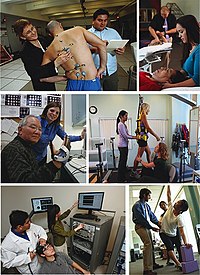
Photo from wikipedia
Purpose The COVID-19 pandemic created a series of challenges for children's health, including several challenges related to nutrition and physical activity in child care settings. Thus, this study explored: 1)… Click to show full abstract
Purpose The COVID-19 pandemic created a series of challenges for children's health, including several challenges related to nutrition and physical activity in child care settings. Thus, this study explored: 1) how COVID-19 impacted nutrition and physical activity in child care settings and how to address these challenges moving forward; 2) potential best practices in child care that emerged during the COVID-19 pandemic worth continuing; and 3) future directions for accessing, implementing, and evaluating COVID-19 federal investments in child care settings. Methods The study utilized a qualitative content analysis approach. In June 2021, the investigators conducted 17 qualitative interviews with federal representatives (n = 4), practitioners (n = 7), and researchers (n = 6). Recruitment continued until saturation was achieved. Virtual interviews lasted approximately 45 to 60 minutes and were recorded, transcribed, and coded for themes and subthemes using thematic content analysis. Results Primary findings included: 1) COVID-19 likely increased stress and exacerbated prevalence of food insecurity for child care staff and participating families, and decreased diet quality among children both while in and outside of child care; 2) flexibilities to federal child care requirements, outdoor learning opportunities, and meal provision strategies implemented during the pandemic were perceived as positive and could continue post-pandemic; and 3) future efforts could utilize the recovery funds to make changes that are equitable and sustainable, such as conducting equity assessments and collaborating with community organizations, along with evaluating impacts of these efforts on food insecurity and health of child care staff and participating children. Conclusion Overall, recommendations focused on several social determinants of health, including addressing food insecurity among both children and staff, and infrastructure for nutrition and physical activity. Continued programmatic and public health recovery efforts aimed to mitigate the negative impacts of COVID-19 are critical to fostering health and wellbeing in child care settings.
Journal Title: Frontiers in Public Health
Year Published: 2022
Link to full text (if available)
Share on Social Media: Sign Up to like & get
recommendations!